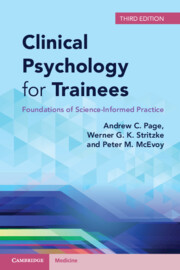
- Publisher:
- Cambridge University Press
- Online publication date:
- April 2022
- Print publication year:
- 2022
- Online ISBN:
- 9781108611350
Our systems are now restored following recent technical disruption, and we’re working hard to catch up on publishing. We apologise for the inconvenience caused. Find out more: https://www.cambridge.org/universitypress/about-us/news-and-blogs/cambridge-university-press-publishing-update-following-technical-disruption

This third edition provides a thorough real-world exploration of the scientist-practitioner model, enabling clinical psychology trainees to develop the core competencies required in an increasingly interdisciplinary healthcare environment. The book has been comprehensively revised to reflect shifts towards transdiagnostic practice, co-design principles, and personalized medicine, and features new chapters on low intensity psychological interventions and private practice. Fully updated for the DSM-5 and ICD-11, provides readers with a contemporary account of diagnoses. It covers practical skills such as interviewing, diagnosis, assessment, case formulation, treatment, case management, and process issues with emphasis on the question 'how would a scientist-practitioner think and act?' The book equips trainees to deliver the accountable, efficient, and effective client-centred service demanded of professionals in the modern integrated care setting by demonstrating how an evidence-base can influence every decision of a clinical psychologist. Essential reading for all those enrolled in, or contemplating, postgraduate studies in clinical psychology.
‘Clinical Psychology for Trainees is an outstanding book. It deals with the most important questions facing today's clinical psychology trainees and students. It is written by three exceptional experts with a science-based perspective on psychological interventions and personalized as well as evidence-based psychotherapy. It is a rich resource for trainees working with patients and links clinical assessment to case formulation, treatment selection, and progress monitoring. I cannot imagine a better resource to learn about precision mental health than this wonderful book. Comprehensive and fun to read, it helps move clinical training and the practice of psychotherapy forward.'
Wolfgang Lutz - Ph.D., Department of Psychology, University of Trier, Germany
‘By providing a trans-theoretical, evidence based, practice oriented, and an up-to-date integration of what we know about clinical psychology, this book does more than embody the scientific-practitioner model – it enhanced every aspect of it. Instructors and students will benefit from the authors' conceptually rich, clinically detailed, and empirically anchored coverage of key competencies, methods, and roles one must learn. Exciting new developments in our field are expertly reviewed, including routine outcome monitoring, personalized interventions and alliance ruptures. At every step, the authors achieve their ambitious goal of showing ‘what a scientist-practitioner actually does to blend state-of-the-science expertise with quality patient care'. I cannot think of a better guide for future trainee clinical psychologists. I will definitely use it as a professor, as it will no doubt help me become a better teacher, supervisor, and mentor.'
Louis G. Castonguay - Ph.D., Liberal Arts Professor of Psychology, Penn State University
‘This book will make a real difference to psychologist therapists seeking to improve treatment through mental health sciences, guiding them from the initial training stage through the whole of their career. These internationally renowned authors discuss the basics of science-informed practice in an engaging and accessible way and provide clear guidance on how to inform clinical decisions based on the data available. One particular highlight is the exploration of the fundamentals of a scientifically sound, evolving and respectful case formulation that takes into consideration the individualized interplay between both client and clinician. This book is an excellent choice for both aspiring scientist-practitioners and established clinicians with a vision for mental health science, and also for those wishing to improve existing mental health treatments. Thank you so much to the authors!’
Emily Holmes - Department of Psychology, Uppsala University, Sweden
 Loading metrics...
Loading metrics...
* Views captured on Cambridge Core between #date#. This data will be updated every 24 hours.
Usage data cannot currently be displayed.